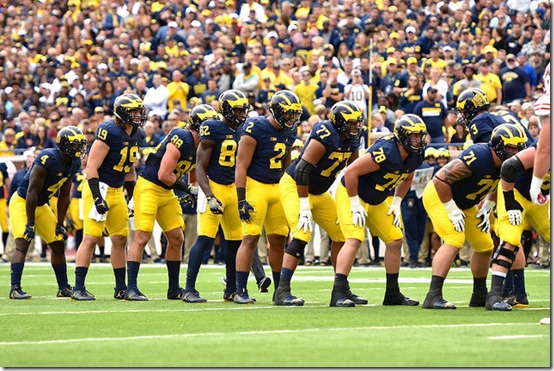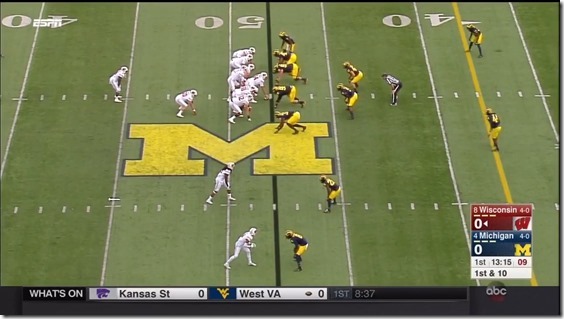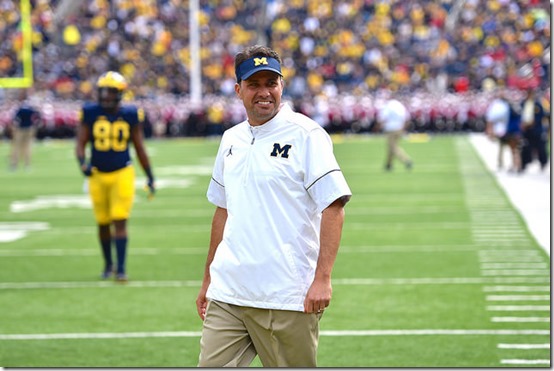2016 wisconsin
[Fuller/MGoBlog]
Michigan’s win over Wisconsin wasn’t put away until Jourdan Lewis executed one of the more dramatic and insanely athletic interceptions most of us will ever see, but the stats show that it should have been over sooner. That won’t come as a shock—if you watched you’re probably thinking of the missed field goals right now—but it does reinforce how good Michigan’s defense is.
Even the most basic stats hint heavily at the defense’s dominance. Wisconsin only ran 53 plays for a paltry 154 yards, or 2.91 yards per play. Michigan’s offense fared far better, running 80 plays for 339 yards, or 4.24 per play. As Jedd Fisch noted this week, no team has crested 330 yards of offense against Wisconsin since the 2015 Alabama game. Not a bad yardage total against a defense that’s still ranked fifth in S&P+.
It’s not all sunshine and roses (or lipstick-shaped trophies), though. Michigan had six scoring opportunities to Wisconsin’s three, but both walked away with 2.33 points per scoring opportunity. Michigan was averaging 6.3 points per trip inside the 40; drives bogging down and missed field goals knocked the points per scoring opportunity number down to below a field goal for the game.
We don’t yet know whether the missed field goals were an aberration or the new, hand-over-the-eyes, college-kickery normal, but it’s relatively clear that Michigan’s offense on the whole did well against one of the best defenses in the nation. Michigan’s offensive Success Rate was 40%, which must have been like a walk in the park for Speight and co. compared to Wisconsin’s offense’s 21%. Wisconsin’s defense is superb; Michigan’s defense is a black hole.
[After THE JUMP: how a low-scoring day impacted the fancy stats]

SPONSOR NOTES: Also at the Marlin tailgate I met a guy who had refinanced with Matt and was now hanging out with him pregame, because they're buds. I didn't judge. Maybe I judged a little.
In addition to being a gentleman replete with Michigan tickets, Matt is also a good man to know if you need a mortgage. It's striking that we actually get non-astroturfed comments about positive experiences with Matt not infrequently.
If you're buying a home or refinancing, he's the right guy to call.
FORMATION NOTES: Michigan spent a lot of time in this formation:
Line is shifted to the TE so that's an over set. Peppers is overhanging the TE. Two deep safeties, press coverage.
They'd also put Peppers inside the end. I called that "4-3 bear".
PERSONNEL NOTES: Wisconsin's manball and constant three and outs caused some shifts in the DL snap distribution. Charlton played every snap—although there were just 53. Wormley and Glasgow were close behind with around 40; Godin and Hurst just about split the other DT spot. Gary (13 snaps), Mone (7), and Winovich(2) rounded out the rotation. Mone's just getting back, obviously; the other two are either freshmen getting their first taste of manball in a game situation or much lighter than alternatives.
The back seven starters never came off the field except for a few dime packages without McCray. Watson(7 snaps) and Kinnel(3) got a little bit of PT on passing downs as extra DBs.
[After THE JUMP: this QB got shook]
[Fuller/MGoBlog]
Can you assess Wilton’s play through five games?
“He’s doing a nice job. He’s making really good decisions, which is obviously the first thing you look for in a guy who’s in his first year starting. Hasn’t turned the ball over very much at all, so that’s exciting. Has found ways to complete balls—he’s over 64% or so—and really good touchdown:interception ratio, and has managed the game really well. So, so far, so good.
“But the next half of the season will be another test. You know, he hasn’t been on the road yet, so that’ll be obviously different. And then we’ve just got a chance to continue to see how he improves.”
He’ll often talk about a play that you’ve dialed up that week and you can see that he likes the creativity. Talk about that side of the job, looking for something new every week or periodically that could be a good play for you.
“I think we’re just—we’re always gameplanning every week, every day. Every day we gameplan and put together the best possible pass game and run game we can, and then, you know, try to deliver it in a way they understand why the plays are in, and then maybe show them examples of plays where whether or not they’ve worked other places or whether or not they’ve worked here or whether it looks like they’ll work based on the coverages we get. Spend a lot of time just kind of explaining in our meetings—all position groups, all coaches—why plays are in and how to go out there and execute them.”
Some of the protection issues with veterans at times: are those mistakes guys shouldn’t be making at this point?
“I think that I don’t know much about whether we should or shouldn’t be making them. I don’t think there’s many being made. I think we’re still—well, we’ve only been sacked in five games eight times or nine times. I don’t know. That’s not much. We do a really good job of picking up almost everything. We get the kitchen sink thrown at us and our guys work really, really hard to pick it all up, and over the course of 17 games or so we’ve probably been as good as anyone in terms of not getting sacked and getting the ball off, so I don’t think there’s much of an issue there.”
When Jabrill’s working in the wildcat, are you hands-on with him in practice there, or who has the most input?
“Oh, with everything, it’s a group collective effort in everything that we do. You know, the wildcat stuff, we throw him in and quarterback roll, then he kind of deals with some of the ball handling with us, but really kind of everybody’s talking to him about what that job entails and what plays we’re putting in and really what he’s going to do with those plays and the footwork and the reads and all that.”
[Much more after THE JUMP]



14